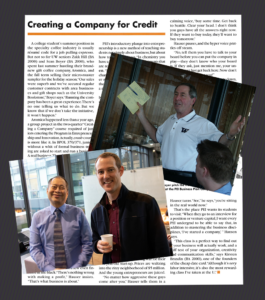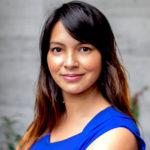Shared Legacy: The Startup Course Changing Lives

The Foster School’s Creating a Company course launched in the Fall of 1998. In 2001, legendary instructor John Castle (on the right) taught it until he retired in 2013. Alan Leong (pictured bottom left with the Buerk Center’s Alex Eli) succeeded Castle in leading the course over the past decade-plus and helped recruit instructors as the course grew in popularity.
In 30+ years of formal entrepreneurship programming in the Foster School, perhaps no two courses have impacted undergraduate students more than Grand Challenges for Entrepreneurs and Creating a Company. The former and its standout instructor Emily Cox-Pahnke received recognition in 2021 from the Aspen Institute. The latter signified a seismic shift in academic offerings when it debuted in the Fall of 1998 under the guidance of Gary Hansen—who launched the Program for Entrepreneurship and Innovation alongside Borje “Bud” Saxberg and venture capitalist Neal Dempsey (BA 1964) in 1991.
What began as a one section offering quickly became two in 2000 and four by 2014—just one year after the Entrepreneurship Minor for non-business students was launched. The popularity of the course, in part, lies in the 2-quarter structure that empowers a diverse group of students to form teams, launch a business, and seek real revenue and funding. However, in 2009, with no minor available for non-business students, it was a challenge to enroll if you were a psychology student destined to become the President and CEO of the Seattle-based biotech company Spiral Genetics (as well as a two-time Forbes 30 Under 30 recipient!).
So, Adina Mangubat (Psychology 2009) sought out a sister course taught at UW-Bothell by Alan Leong—the very instructor who would take over Creating a Company at Foster in 2011 and leave an indelible mark of his own over the next decade-plus. He brought with him the “Hell Night” pitch competition as a core component to prepare students for launch.
It certainly did for Mangubat. She lists “Winner of Hell Night 2009” on her LinkedIn next to “Dean’s List” at UW. Since then, she’s been a dedicated mentor to Creating a Company students. Here is why:
Alan’s class was really the first time that I saw other people like me that were starting their own companies. He brings back alumni started companies at the same age that the students are now. I didn’t have any background in genetics or computer science. It took a non-matriculated molecular biologist PhD who happened to be in the course at the same time as I was and my ability to explain complex ideas in a way other people could understand them. Her name was Becky Drees (Entrepreneurship Capstone Program, 2009) and together, boom, there was a company we co-founded together!
Diversity really does breed innovation—the more you can get in terms of ages, backgrounds, technical interests, majors, et cetera, the more interesting things happen. Put a chef and a chemist together, and you get molecular gastronomy. And it’s not just interest, but also your gender, sexual orientation, background, it all provides a unique perspective and there may be companies that can address challenges in those worlds.
What I will tell students is that your first idea might not be the final idea. At the end of the day, investors, especially in the early stages, are investing in you. How do you explain the things that you are passionate about in a way that is going to be compelling to other people? That’s why the pitch competition (Hell Night) is perfect because it teaches people how to communicate.
I love entrepreneurs—first-time entrepreneurs in particular—and I dedicate time, every month, to making sure that the next generation has what they need because I didn’t do this by myself. That is something that is special about the alumni network connected to this course. Entrepreneurship is not necessarily for everyone, but it can be if you want it to be for you. And there are support systems here to enable you to really go for it.”
*A version of this story was featured in the December 2021 issue of the Foster Business Magazine. You can see that story here.

